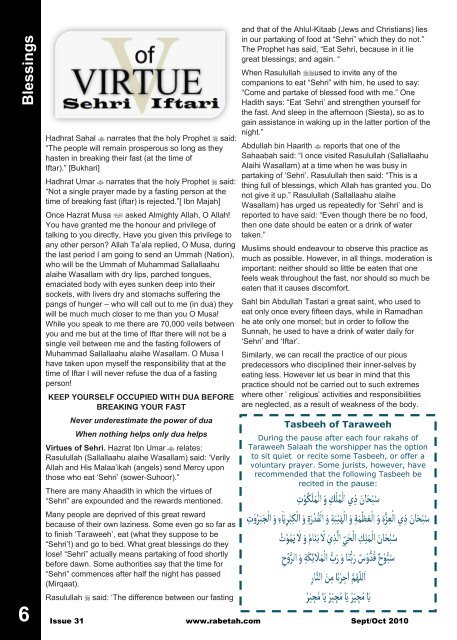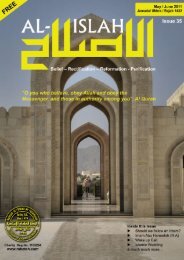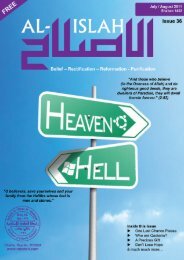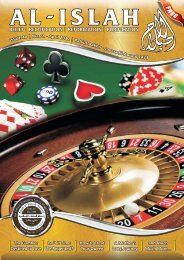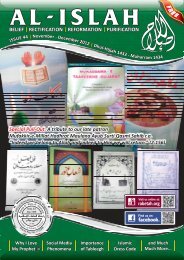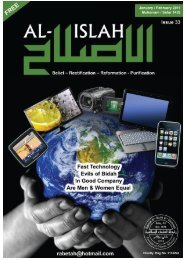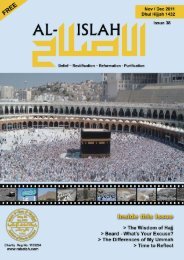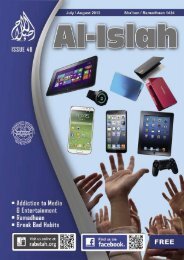Ramadhan - Rabetah
Ramadhan - Rabetah
Ramadhan - Rabetah
You also want an ePaper? Increase the reach of your titles
YUMPU automatically turns print PDFs into web optimized ePapers that Google loves.
Blessings<br />
6<br />
Hadhrat Sahal narrates that the holy Prophet said:<br />
―The people will remain prosperous so long as they<br />
hasten in breaking their fast (at the time of<br />
Iftar).‖ [Bukhari]<br />
Hadhrat Umar narrates that the holy Prophet said:<br />
―Not a single prayer made by a fasting person at the<br />
time of breaking fast (iftar) is rejected.‖[ Ibn Majah]<br />
Once Hazrat Musa asked Almighty Allah, O Allah!<br />
You have granted me the honour and privilege of<br />
talking to you directly, Have you given this privilege to<br />
any other person? Allah Ta‘ala replied, O Musa, during<br />
the last period I am going to send an Ummah (Nation),<br />
who will be the Ummah of Muhammad Sallallaahu<br />
alaihe Wasallam with dry lips, parched tongues,<br />
emaciated body with eyes sunken deep into their<br />
sockets, with livers dry and stomachs suffering the<br />
pangs of hunger – who will call out to me (in dua) they<br />
will be much much closer to me than you O Musa!<br />
While you speak to me there are 70,000 veils between<br />
you and me but at the time of Iftar there will not be a<br />
single veil between me and the fasting followers of<br />
Muhammad Sallallaahu alaihe Wasallam. O Musa I<br />
have taken upon myself the responsibility that at the<br />
time of Iftar I will never refuse the dua of a fasting<br />
person!<br />
KEEP YOURSELF OCCUPIED WITH DUA BEFORE<br />
BREAKING YOUR FAST<br />
Never underestimate the power of dua<br />
When nothing helps only dua helps<br />
Virtues of Sehri. Hazrat Ibn Umar relates:<br />
Rasulullah (Sallallaahu alaihe Wasallam) said: ‗Verily<br />
Allah and His Malaa‘ikah (angels) send Mercy upon<br />
those who eat ‗Sehri‘ (sower-Suhoor).‖<br />
There are many Ahaadith in which the virtues of<br />
―Sehri‖ are expounded and the rewards mentioned.<br />
Many people are deprived of this great reward<br />
because of their own laziness. Some even go so far as<br />
to finish ‗Taraweeh‘, eat (what they suppose to be<br />
―Sehri‘!) and go to bed. What great blessings do they<br />
lose! ―Sehri‖ actually means partaking of food shortly<br />
before dawn. Some authorities say that the time for<br />
―Sehri‖ commences after half the night has passed<br />
(Mirqaat).<br />
Rasulullah said: ‗The difference between our fasting<br />
and that of the Ahlul-Kitaab (Jews and Christians) lies<br />
in our partaking of food at ―Sehri‖ which they do not.‖<br />
The Prophet has said, ―Eat Sehri, because in it lie<br />
great blessings; and again. ―<br />
When Rasulullah used to invite any of the<br />
companions to eat ―Sehri‖ with him, he used to say:<br />
―Come and partake of blessed food with me.‖ One<br />
Hadith says: ―Eat ‗Sehri‘ and strengthen yourself for<br />
the fast. And sleep in the afternoon (Siesta), so as to<br />
gain assistance in waking up in the latter portion of the<br />
night.‖<br />
Abdullah bin Haarith reports that one of the<br />
Sahaabah said: ―I once visited Rasulullah (Sallallaahu<br />
Alaihi Wasallam) at a time when he was busy in<br />
partaking of ‗Sehri‘. Rasulullah then said: ―This is a<br />
thing full of blessings, which Allah has granted you. Do<br />
not give it up.‖ Rasulullah (Sallallaahu alaihe<br />
Wasallam) has urged us repeatedly for ‗Sehri‘ and is<br />
reported to have said: ―Even though there be no food,<br />
then one date should be eaten or a drink of water<br />
taken.‖<br />
Muslims should endeavour to observe this practice as<br />
much as possible. However, in all things, moderation is<br />
important: neither should so little be eaten that one<br />
feels weak throughout the fast, nor should so much be<br />
eaten that it causes discomfort.<br />
Sahl bin Abdullah Tastari a great saint, who used to<br />
eat only once every fifteen days, while in <strong>Ramadhan</strong><br />
he ate only one morsel; but in order to follow the<br />
Sunnah, he used to have a drink of water daily for<br />
‗Sehri‘ and ‗Iftar‘.<br />
Similarly, we can recall the practice of our pious<br />
predecessors who disciplined their inner-selves by<br />
eating less. However let us bear in mind that this<br />
practice should not be carried out to such extremes<br />
where other ‘ religious‘ activities and responsibilities<br />
are neglected, as a result of weakness of the body.<br />
Tasbeeh of Taraweeh<br />
During the pause after each four rakahs of<br />
Taraweeh Salaah the worshipper has the option<br />
to sit quiet or recite some Tasbeeh, or offer a<br />
voluntary prayer. Some jurists, however, have<br />
recommended that the following Tasbeeh be<br />
recited in the pause:<br />
Issue 31 www.rabetah.com Sept/Oct 2010


